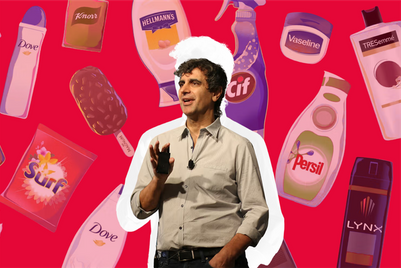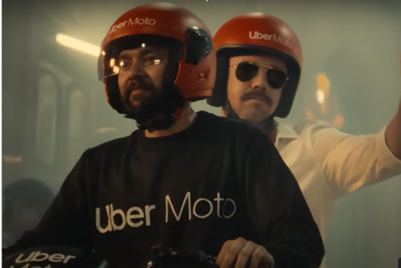
Campaign India spoke to Sir John Hegarty, Nigel Bogle and Simon Sherwood and discussed their India vision and plans.
What are your expectations out of your India office?
Nigel Bogle: When BBH starts a new office, it always plays the long-term game. We think India is a big opportunity for us both, because a number of our existing clients have major interests here and also we feel that the team that we've put together, should be the basis of a very attractive proposition in the Indian market. So, our expectations are to build a very modern expression of the BBH brand, attracting both international work and, hopefully, also the best of the Indian business.
The Unilever brands internationally must be the low hanging fruit. Are you meeting any of them on this trip and talking business with them? Will these brands kick-off your operations in India?
Simon Sherwood: We have over five Unilever brands globally and we're meeting with the managers of those brands in India on this trip. It would be discourteous not to meet them. It would be a good opportunity for us to introduce our team to them. All these meetings are very informal, please do not read anything into them.
Sir John Hegarty: I think the difference with us is that we never actually go with a piece of business into the market. We start in a market because we feel it's right for us to be present there. We've always started with no business and then talked to clients we have relationships with and see if we can do business with them.
Simon Sherwood: When we get to January, we will be able to tell you that there are three or four bits of business that we have been appointed to handle in India.
One of the easy parts is getting the operations right. The difficult bit is the creative product; the BBH DNA seeping into the India office. How does one ensure that happens, or is there no such thing as a transportable DNA?
Sir John Hegarty: There is. It's represented by the black sheep. But there is no form or way or ritual that you go through. But, it's in the selection process of looking for people to work with. It's people who are sympathetic to the way we work, which I've described as turning intelligence into magic. It's about find people who understand the principles of BBH and understand what we're trying to do with a sympathy and a belief in what we're doing. That's really half the battle won, getting the right people, which we have.
Once you've done that, you're well on your way to a good creative output. We want the Indian office to have an Indian tone of voice. This is very important to us. They do so with the principles of the black sheep.We believe creativity is a much harder thing to define and easy to recognize. But it's about finding people who have the sympathy with the beliefs that we have.
How often will we see the three of you, individually or otherwise coming into India? Because, it's a fairly common thing to set up shop in India, and, for whatever reason, disappear.
Simon Sherwood: Our network is fairly small; it's not difficult to get around. We do travel by the lot. I think we all recognize that it is quite important that we spend time in each of those offices. So, I fully expect that next year one of us will be here every quarter. The last year I spent 23 weeks outside the UK and all those 23 weeks were spent in other BBH offices.
Nigel Bogle: When we talk about BBH's being one agency in now six places, it's very important that we make India feel and be a part of that. We're not just setting up an office and then disappearing . We've never done that. As Simon says, we have actually six offices, it's not 106 where you'll be getting into one every four or five years. We will be here a lot.
Coming to the people, it is a small operation you've got as of now. I'm sure there's a ramp up plan. So, any thoughts you can share on how you will be ramping up?
Simon Sherwood: It's very difficult to anticipate and project the pace of that. This is the end of our third year in China and we've got just over 40 people. I expect here, much faster than that because I think there are some bigger client-based opportunities here than in China, right now. Right now we're in a temporary office that accommodates up to 12 to 15 people. We'll be there till the middle of next year when we'll find our own permanent office. We'll look for office space that can accommodate up to probably, 60 or 70 people and hope that will last us for a good three years or so. Moving offices is not something that we want to do; it can be quite disruptive. We need to work that out quite carefully. We'll make the first hirings this side of Christmas beyond the three founding partners. By the second or third month next year it will be 12 people in the office.
Do you see the number of offices increasing? India is an unusual country. A single city operation is a bit difficult to service most of the larger brands…
Sir John Hegarty: We have no plans to open another office in India other than this one in Mumbai. I've been asked this question a lot, saying, how many offices in India are you going to have? And we already have five in the world! How many more are we going to need? They'd say at least three or four. We are only planning to have this one, and I think this is the right place to have it.
People told us many years ago, that our whole idea was not possible to have a global business with only half a dozen offices. But we've managed so far to buck the trend.
Particularly now with the downturn, we're hearing a lot of talk about the digital space, about below-the-line, and brands focusing more and looking at those areas much harder than they did. So in your initial 12 or 15 person office, how much of digital will we see?
Nigel Bogle: One of the people we're talking to right now is the digital designer, so we're looking at it from day one. We'll be able to embrace the needs of that space to develop digital communication.
So you won't be tapping into the UK or some of the other offices…
Nigel Bogle: No, we have those resources in all our offices , so it's important to have them here as well.
We want BBH to be an agency for the digital age. And one of the good things about starting here is that you can design your business to absolutely reflect the current needs and the opportunities of this new communications landscape. There's no baggage, you're not trying to change one thing into another which is a challenge for a lot of organizations. We can start on day one with the absolutely modern contemporary digital facing business, which I think is an advantage.
Have you spent time trying to think about what is happening in the digital space in India?
Sir John Hegarty: I haven't, but we have, as a team. That's something that we face in every market that we're in. Because, the pace of change is extraordinary and we've adopted a do-and-learn approach to develop our businesses. There is no single answer to how you structure an agency, to make the most of the opportunities out there. You have to try new things and organizational structures and see what works. That's what we've done.
It will be, as Nigel says, a future facing communications business that is conceived and created in the digital era, so it should be very contemporary.
What would you like to be able to say about your India office, one year from now?
Sir John Hegarty: We would look at the work and say it's outstanding. We've never tried to go and be a certain size. We want to be the best, not the biggest. It's all about the work.
Pictured left to right: Sir John Hegarty, Nigel Bogle and Simon Sherwood


.jpg&h=334&w=500&q=100&v=20250320&c=1)
.jpg&h=334&w=500&q=100&v=20250320&c=1)



.jpg&h=334&w=500&q=100&v=20250320&c=1)



.jpg&h=334&w=500&q=100&v=20250320&c=1)








